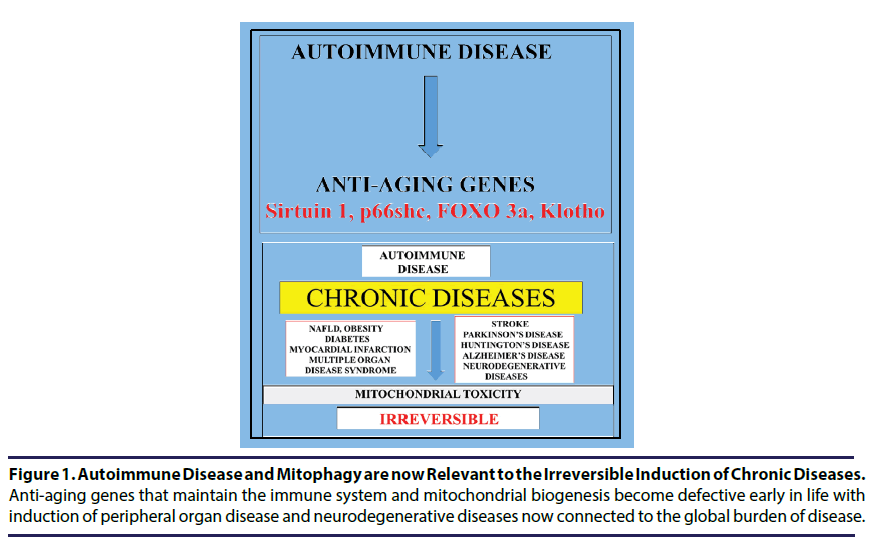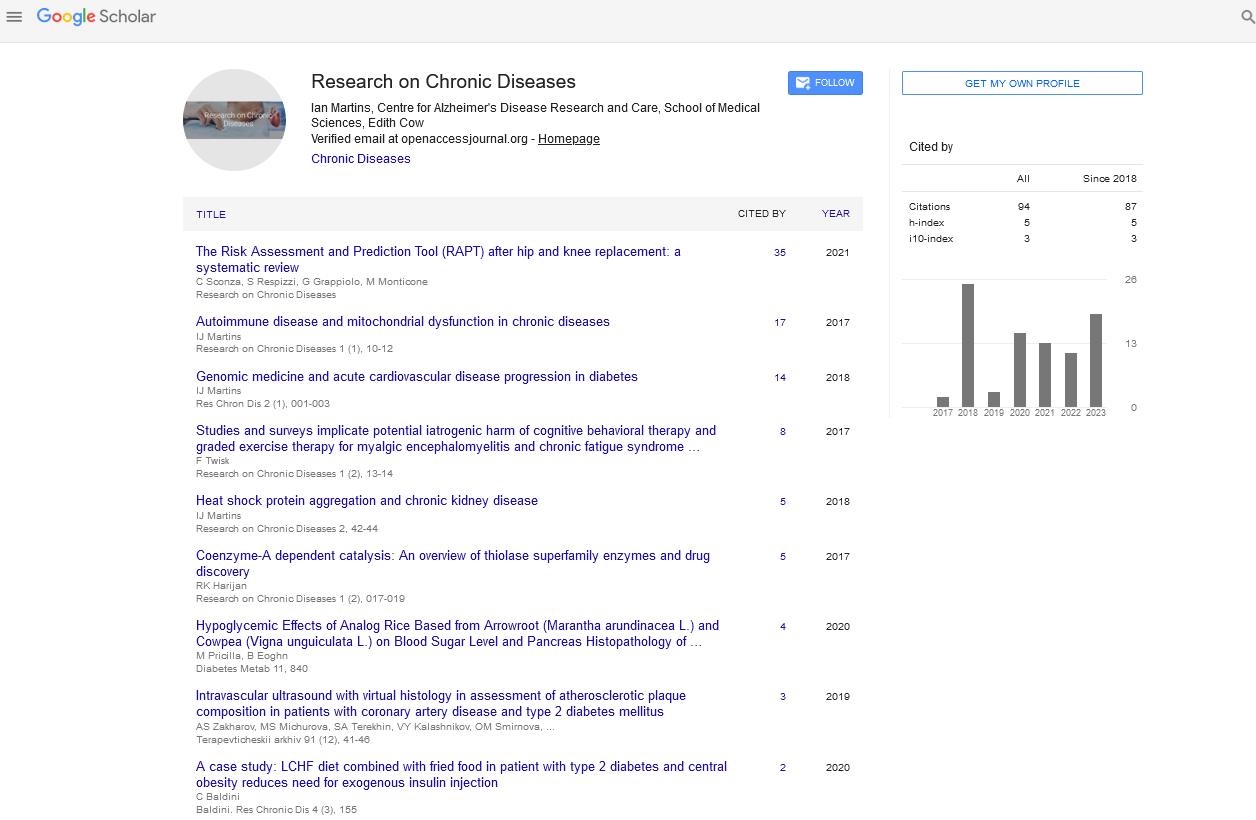Editorial - Research on Chronic Diseases (2017) Volume 1, Issue 1
Autoimmune disease and mitochondrial dysfunction in chronic diseases
- *Corresponding Author:
- Martins IJ
Centre of Excellence in Alzheimer’s Disease Research and Care
School of Medical Sciences
Edith Cowan University
270 Joondalup Drive
Joondalup, 6027, Australia
E-mail: i.martins@ecu.edu.au
Abstract
Anti-aging genes such as Klotho, FOXO 3a, p66shc and Sirtuin 1 (Sirt 1) are connected to various chronic diseases and repression of Sirt 1 is involved with the transcriptional dysregulation of other anti-aging genes (Klotho, p66shc, FOXO1/FOXO3a) that leads to abnormal regulation of glucose, lipid and amyloid beta metabolism associated with programmed cell death in various cell and tissues. Anti-aging genes and their connections to autoimmune disease and chronic diseases has attracted interest with relevance to irreversible programmed cell death in many tissues. Dietary effects with Sirt 1 downregulation accelerate disease progression with autonomous disease connected to a defective immune system in various global communities.
Defective anti-aging genes are responsible for programmed cell death in chronic disease.
Keywords
autoimmune disease, mitophagy, heat shock proteins, core body temperature, multiple organ disease syndrome
Editorial
Anti-aging genes such as Klotho, FOXO 3a, p66shc and Sirtuin 1 (Sirt 1) are connected to various chronic diseases and repression of Sirt 1 is involved with the transcriptional dysregulation of other anti-aging genes (Klotho, p66shc, FOXO1/FOXO3a) that leads to abnormal regulation of glucose, lipid and amyloid beta metabolism associated with programmed cell death in various cell and tissues [1]. Anti-aging genes and their connections to autoimmune disease [2-5] and chronic diseases has attracted interest with relevance to irreversible programmed cell death in many tissues. Dietary effects with Sirt 1 downregulation [1] accelerate disease progression with autonomous disease connected to a defective immune system in various global communities [6].
Mitophagy has become of major concern to various chronic diseases [7-9] with accelerated mitochondrial apoptosis connected to the heat shock gene Sirt 1 [10]. Sirt 1 is involved in mitochondrial biogenesis and its connections ti the other anti-aging genes via deacetylation of the transcription factor p53 have become important to mitochondrial biogenesis versus mitochondrial apoptosis. p53 is critical to the maintenance of the immune system [11,12] and its role mitochondrial function is connected to the various anti-aging genes. Sirt 1 is now connected to autoimmune disease [6] and its regulation of p53 and the anti-aging genes (Figure 1) may be the primary defect with irreversible consequences to cell biology and programmed cell death involved with the many chronic diseases in the developing and developed world.
Figure 1. Autoimmune Disease and Mitophagy are now Relevant to the Irreversible Induction of Chronic Diseases. Anti-aging genes that maintain the immune system and mitochondrial biogenesis become defective early in life with induction of peripheral organ disease and neurodegenerative diseases now connected to the global burden of disease.
The origin of chronic disease that involve the autoimmune process and abnormal immune responses are connected to mitochondrial disease and have raised concerns with relevance to irreversible processes that may now be involved in non alcoholic fatty liver disease (NAFLD), obesity, diabetes, multiple organ disease syndrome and neurodegenerative diseases (Figure 1). Analysis of plasma heat shock proteins (HSP) is now essential to avoid uncontrolled immune reactions connected to the repression of the heat shock gene Sirt 1 that is responsible for HSP metabolism [13]. In the normal aging process HSP accumulate with autoimmune reactions and mitophagy connected to the progression of age related diseases [13-17]. The relevance of abnormal core body temperature [13] has become of major concern to the early origins of chronic disease with the critical maintenance of body temperature that implicates that anti-aging gene Sirt 1 in core body temperature and immune system regulation. The irreversible induction of HSP mediated programmed cell death should be avoided in various chronic diseases with careful maintenance of the suprachiasmatic nucleus [13] in the brain that is involved with core body temperature regulation [14,18] in many neurodegenerative diseases and connected to peripheral organ disease. The alterations in the light/dark cycle [19,20] may be the primary factor involve in the induction of HSP alterations connected to autoimmune disease and mitophagy. Anti-aging genes and their connections to autoimmune disease mitophagy now identify Sirt 1 to be defective with increased HSP levels involved in autoimmune disease and mitophagy connected to irreversible programmed cell death in many organ diseases in global populations.
Acknowledgements
This work was supported by grants from Edith Cowan University, the McCusker Alzheimer’s Research Foundation and the National Health and Medical Research Council.
References
- Martins IJ, Anti-Aging Genes Improve Appetite Regulation and Reverse Cell Senescence and Apoptosis in Global Populations. Adv. Aging. Res. 5, 9-26 (2016).
- Bian A, Neyra JA, Zhan M et al. stem cells, and aging. Clin. Interv. Aging. 10, 1233-1243 (2015).
- Finetti F, Pellegrini M, Ulivieri C et al. The proapoptotic and antimitogenic protein p66SHC acts as a negative regulator of lymphocyte activation and autoimmunity. Blood. 111, 5017-5027 (2008).
- Pacini S, Pellegrini M, Migliaccio E et al. p66SHC promotes apoptosis and antagonizes mitogenic signaling in T cells. Mol. Cell. Biol. 24(4), 1747-1757 (2004).
- Hedrick SM. The cunning little vixen: Foxo and the cycle of life and death. Nat. Immunol. 10, 1057-1063 (2009).
- Martins IJ. Defective Interplay between Adipose Tissue and Immune System Induces Non Alcoholic Fatty Liver Disease. Updates Nutr. Disorders. Ther. 1, 3(1) (2017).
- Springer MZ, Macleod KF. Mitophagy: Mechanisms and Role in Human Disease. J. Pathol. 240, 253–255 (2016).
- Taylor R, Goldman SJ. Mitophagy and disease: new avenues for pharmacological intervention. Curr. Pharm. Des. 17, 2056-2073 (2011).
- Vásquez-Trincado C, García-Carvajal I, Pennanen C et al. Mitochondrial dynamics, mitophagy and cardiovascular disease. J. Physiol. 594, 509-525 (2016).
- Martins IJ. Single Gene Inactivation with Implications to Diabetes and Multiple Organ Dysfunction Syndrome. J. Clin. Epigenet. 3, 1-8 (2017).
- Muñoz-Fontela C, Mandinova A, Aaronson SA et al. Emerging roles of p53 and other tumour-suppressor genes in immune regulation. Nat. Rev. Immunol. 16, 741-750 (2016).
- Cui Y, Guo G. Immunomodulatory Function of the Tumor Suppressor p53 in Host Immune Response and the Tumor Microenvironment. Int. J. Mol. Sci. 17, E 1942 (2016).
- Martins IJ. Regulation of Core Body Temperature and the Immune System Determines Species Longevity. Curr. Updates. Gerontol. 1, 1-6 (2017).
- Moudgil KD, Thompson SJ, Geraci F et al. Heat-Shock Proteins in Autoimmunity. Autoimmu. Dis. 2013, 621417 (2013).
- Keijzer C, Wieten L, van Herwijnen M, et al. Heat shock proteins are therapeutic targets in autoimmune diseases and other chronic inflammatory conditions. Expert. Opin. Ther. Targets. 16, 849-857 (2012).
- Murshid A, Eguchi T, Calderwood SK. Stress proteins in aging and life span. Int. J. Hyperthermia. 29, 442-447 (2013).
- Rodgers KJ, Ford JL, Brunk UT. Heat shock proteins: keys to healthy ageing? Redox. Rep. 14, 147-153 (2009).
- Morf J, Schibler U. Body temperature cycles:Gatekeepers of circadian clocks. Cell. Cycle. 12, 539–540 (2013).
- Ng F, Wijaya L, Tang BL. SIRT1 in the brain-connections with aging-associated disorders and lifespan. Front. Cell. Neurosci. 9, 64 (2015).
- Colin-Gonzalez AL, Aguilera G, Serratos IN, et al. On the Relationship Between the Light/Dark Cycle, Melatonin and Oxidative Stress. Curr. Pharm. Des. 21, 3477-3488 (2015).

